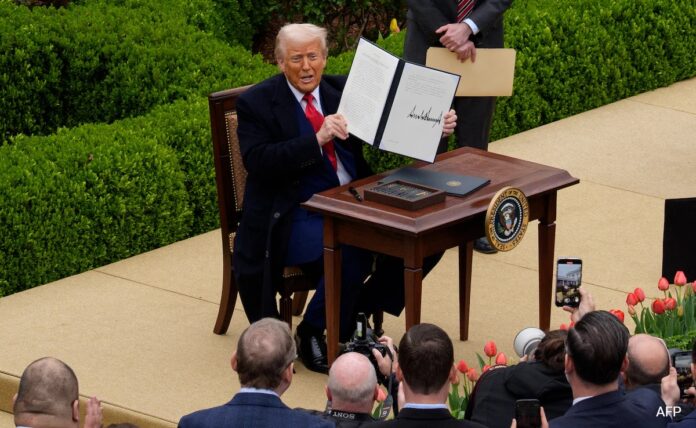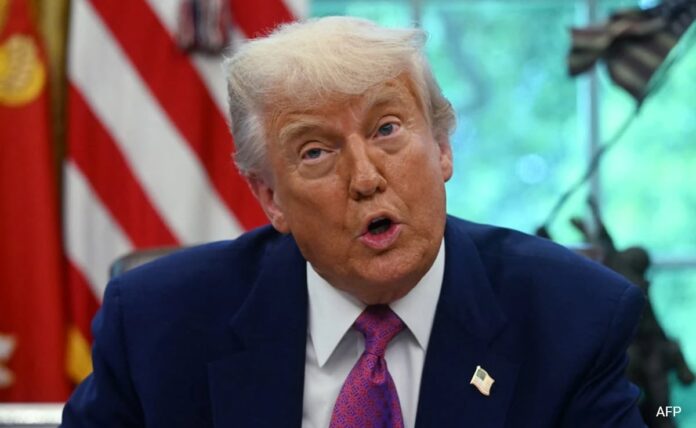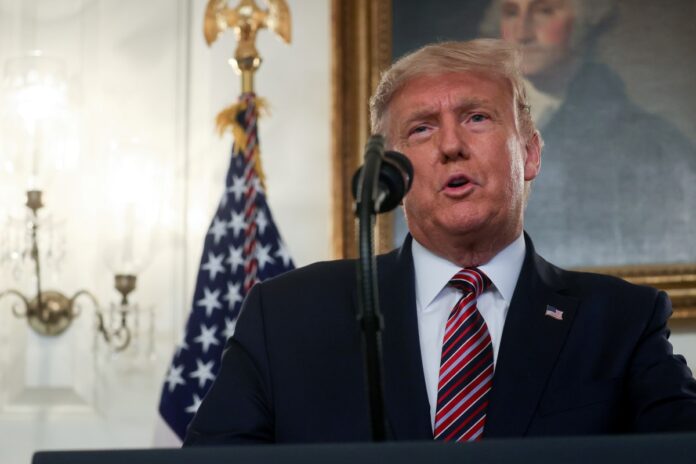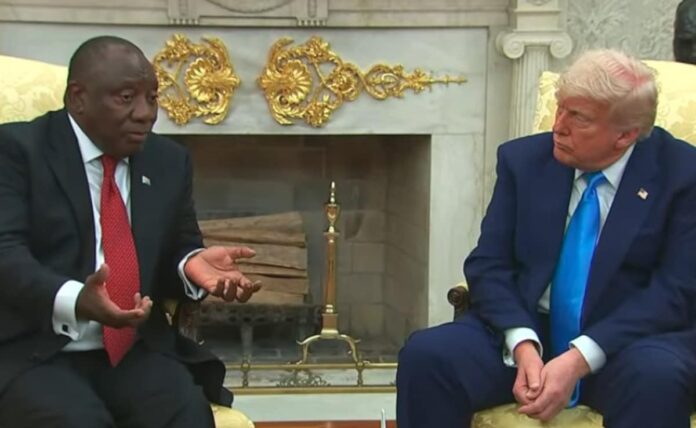New Delhi:
US President Donald Trump announced global reciprocal tariffs on trading partners on Wednesday (local time), calling it a “declaration of economic independence.” A “baseline tariff” of 10 per cent will apply to economies globally and will take effect at 12:01 am on April 5, while higher rates will apply to those the White House considers “the worst offenders” and will kick in at 12:01 am on April 9.
President Trump announced “discounted reciprocal tariffs” of 26 per cent on India and 34 per cent on China. Speaking about India, he described tariffs by New Delhi as “very very tough.”
“Their Prime Minister (Narendra Modi) just left (US recently)…he is a great friend of mine, but I said to him that ‘you’re a friend of mine, but you’ve not been treating us right’. India charges us 52 per cent, so we will charge them half of that – 26 per cent,” he said.
Along with this, on Thursday, 25 per cent tariffs on automobiles coming into the US will come into effect. Tariffs on certain car parts will start in May or later.
The US has introduced tariffs to “make America great again.” It is time for America to prosper, said President Trump.
“This is one of the most important days… in American history; it’s our Declaration of Economic Independence. For years, hard-working American citizens were forced to sit on the sidelines… But now it’s our time to prosper.”
However, tariffs could push prices up for American consumers.
What are tariffs?
A tariff is a tax levied on goods imported from other countries. For example, if you, living in the US, purchase sneakers made in China, the American government might add a tax on those sneakers. The companies that bring foreign goods into the country pay taxes or tariffs to the government.
While you will not have to pay the tariff directly, the company can decide to increase the cost of the product to compensate for the tariff amount, which means you, as a consumer, might end up paying more.
Tariffs make foreign products costlier and harder to sell abroad. Foreign companies might have to cut prices and sacrifice profits to offset the tariff and retain their market share in the respective country.
5 items likely to be expensive for Americans
Cars
President Trump has announced a flat 25 per cent tariff on cars and parts. This means the cost of cars built in America will increase along with those imported into the country.
While tariffs aim to boost US manufacturing, automobiles built in US factories will still take a hit as taxes will be levied on parts as well. All 10.2 million cars built in US factories last year were built with a significant number of imported parts, mainly from Canada and Mexico, reported CNN.
Anderson Economic Group forecasts car prices to increase $2,500 to $20,000. Vehicles expected to be hit hardest, the group said, include luxury sedans and SUVs manufactured by Audi, BMW, Jaguar-Land Rover, Mercedes-Benz, Genesis and Lexus.
Clothing and shoes
The bulk of apparel and shoes sold in the US is manufactured outside the country, with China, Vietnam and Bangladesh among the biggest exporters. All three nations are facing heavy reciprocal tariff at 34 per cent, 46 per cent and 37 per cent, respectively.
Wine and coffee
President Trump has threatened a 200 per cent tariff on alcohol from the European Union. This could make Spanish wine, French champagne, or German beer more expensive for Americans, though it is not clear if this will be carried out.
The US is the world’s second leading importer of coffee (both Arabica and Robusta varieties). In 2023, about 80 percent of US unroasted coffee imports came from Latin America (valued at $4.8 billion), primarily from Brazil (35 per cent) and Colombia (27 percent), according to the US Department of Agriculture.
President Trump has imposed 10 per cent reciprocal tariffs on both Brazil and Colombia.
Avocados
Avocados thrive in the Mexican climate. Mexico is the number one avocado supplier to the United States, with 89 percent of US avocado imports. The US Agriculture Department has warned that tariffs on Mexican fruit and vegetables could increase the cost of avocados. Related dishes like guacamole could also become more expensive.
Fuel prices
Canada is America’s largest foreign supplier of crude oil. According to the most recent official trade figures, 61% of oil imported into the US between January and November last year came from Canada, as per a BBC report.
The US has introduced a 10% tariff on Canadian energy.
The US doesn’t have a shortage of oil, but its refineries are designed to process “heavier” – or thicker – crude oil, which mostly comes from Canada, with some from Mexico, as per BBC.
“Many refineries need heavier crude oil to maximise flexibility of gasoline, diesel and jet fuel production,” according to the American Fuel and Petrochemical Manufacturers.








